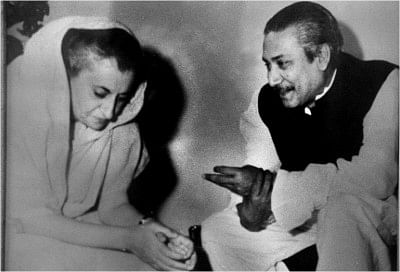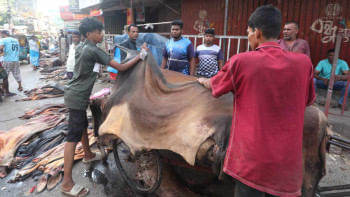Indira Gandhi . . . in our collective memory

Photo: Archive
Our acknowledgement of Indira Gandhi's contribution to Bangladesh's War of Liberation has always been there. And now that the government of Bangladesh has officially taken note of that acknowledgement, through honouring the late Indian prime minister posthumously, we reassert the crucial and decisive role Mrs. Gandhi played in that long ago war for Bengali freedom. The role, if you go back to a recapitulation of history, was for us, indeed for South Asia as a whole, defined the nature of what would come to shape and characterise geopolitics in the region.
We in Bangladesh recall the spontaneity with which Indira Gandhi and her government came forth to provide shelter and sustenance to the Bengali refugees, ten million in all, forced to flee their own land in the face of Pakistani military persecution. The Indians would have been perfectly within their rights had they chosen to adopt a stance of indifference to the plight of the Bengalis. The argument could have been made that the genocide in Bangladesh was an internal matter for Pakistan; that all those years after Partition, India would have little to do with a state created on the basis of communal politics in 1947.
Indira Gandhi did not choose that path. It was the purely humanitarian that came into her approach. For nine months, even as the rest of the world demanded a political solution to the crisis, it was the Indian government which bore the burden of keeping the refugees alive and safe. And then came the bigger move of providing sanctuary to the Bangladesh government-in-exile. When Tajuddin Ahmed met Indira Gandhi in early April, one of the first questions she put to him related to the whereabouts of Bangabandhu Sheikh Mujibur Rahman. It was the Father of the Nation's safety that was to be one of her preoccupations over the next nine months. And with that came her no-holds barred support, moral as well as material, to the struggle of seventy five million Bengalis for freedom. Mrs. Gandhi's government created the proper ambience for provision of guerrilla training to the Mukti Bahini and ensuring an adequate supply of arms and ammunition to the young men going back to their country to wage war against Pakistan.
Indira Gandhi toured the refugee camps, kept in touch with the Mujibnagar government, ensured a smooth functioning of the clandestine radio that would famously come to be known as Shwadhin Bangla Betar Kendra. And then she went touring the significant capitals of the world, the better to keep her counterparts posted on the ground realities in occupied Bangladesh. Her calm demeanour and her grace enhanced the quality of her global presence. Her insistence that the Yahya Khan military regime negotiate a political settlement to the crisis with the elected leaders of Bangladesh was her way of informing the world that her country did not harbour any designs on Pakistan. And yet, in shrewdness born of a long career in politics, she left no one in any doubt that should Pakistan go for the misadventure of pouncing on India, she would not stay silent. When truculent western journalists asked her why India was providing shelter to the Bengali refugees, she bristled in urbane anger, before shooting her own question at them: why had the western powers come to the aid of Europe's Jews and other oppressed people when the Nazis ran riot all over the continent between 1939 and 1945?
In 1971, Indira Gandhi forged a crucial link between politics and diplomacy to help the Bengali cause. She made it unambiguously clear to the Nixon administration that it was making a huge mistake by tilting towards Pakistan. And with the Soviet Union, she went for a definitive new alignment through concluding a treaty of cooperation in August 1971. In December, as the Indian army and the Mukti Bahini forced Pakistan's soldiers into retreat on the battlefield, the Soviet Union helped keep all resolutions for a ceasefire at bay at the United Nations Security Council until the Pakistan army surrendered in Dhaka, until Bangladesh emerged as a free republic on the ashes of East Pakistan. Indira Gandhi heeded Bangabandhu's call for a withdrawal of Indian soldiers from Bangladesh without reservation. The soldiers went home in March 1972. That was Mrs. Gandhi's gift to Bangladesh, on Bangabandhu's fifty second birthday.
Forty years after our tryst with destiny, we do not forget that Indira Gandhi was the larger than life stateswoman who helped bring that destiny closer to our doorstep. We have remembered. And we say, to her soul: 'Thank you!' For now, for all time.

 For all latest news, follow The Daily Star's Google News channel.
For all latest news, follow The Daily Star's Google News channel. 



Comments